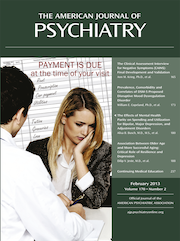Common Genetic Variation and Antidepressant Efficacy in Major Depressive Disorder: A Meta-Analysis of Three Genome-Wide Pharmacogenetic Studies
Abstract
Objective
Indirect evidence suggests that common genetic variation contributes to individual differences in antidepressant efficacy among individuals with major depressive disorder, but previous studies may have been underpowered to detect these effects.
Method
A meta-analysis was performed on data from three genome-wide pharmacogenetic studies (the Genome-Based Therapeutic Drugs for Depression [GENDEP] project, the Munich Antidepressant Response Signature [MARS] project, and the Sequenced Treatment Alternatives to Relieve Depression [STAR*D] study), which included 2,256 individuals of Northern European descent with major depressive disorder, and antidepressant treatment outcomes were prospectively collected. After imputation, 1.2 million single-nucleotide polymorphisms were tested, capturing common variation for association with symptomatic improvement and remission after up to 12 weeks of antidepressant treatment.
Results
No individual association met a genome-wide threshold for statistical significance in the primary analyses. A polygenic score derived from a meta-analysis of GENDEP and MARS participants accounted for up to approximately 1.2% of the variance in outcomes in STAR*D, suggesting a weakly concordant signal distributed over many polymorphisms. An analysis restricted to 1,354 individuals treated with citalopram (STAR*D) or escitalopram (GENDEP) identified an intergenic region on chromosome 5 associated with early improvement after 2 weeks of treatment.
Conclusions
Despite increased statistical power accorded by meta-analysis, the authors identified no reliable predictors of antidepressant treatment outcome, although they did identify modest, direct evidence that common genetic variation contributes to individual differences in antidepressant response.



